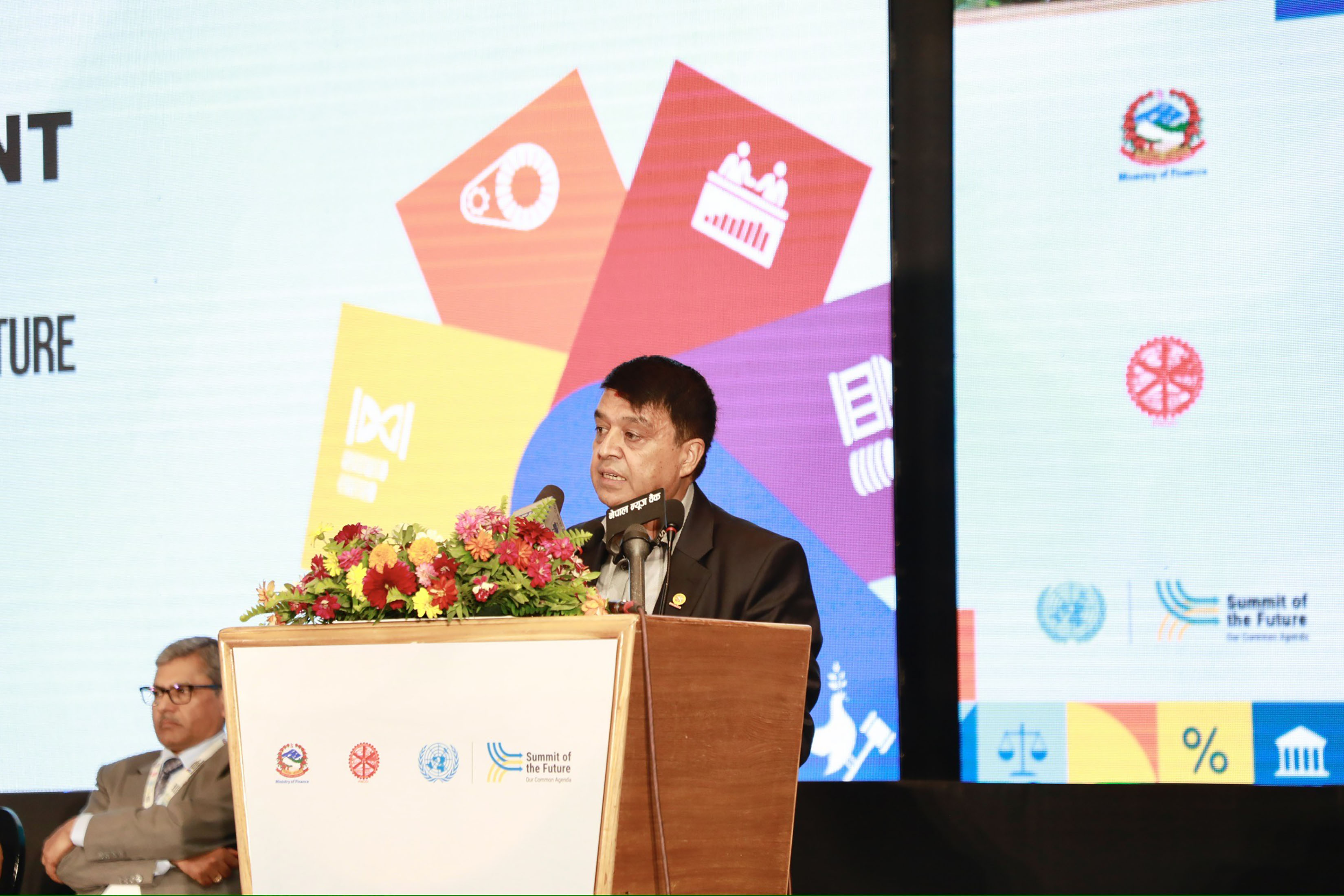Finance Minister Bishnu Paudel said on Tuesday that it has become more difficult for developing and least developed countries to manage resources for development due to their weakening capacity to mobilise internal revenues amid soaring public debt.
Paudel made the remark during his address at the programme titled ‘Finance for Development Dialogue’ organised by the United Nations in partnership with the Ministry of Finance and the Federation of Nepalese Chambers of Commerce and Industry (FNCCI) in Kathmandu.
The finance minister and other speakers at the programme stressed the need for a comprehensive discussion on financing for development.
Though Foreign Direct Investment (FDI) to Nepal surged by 36.1% in the last fiscal year, the amount was still only Rs 8.4 billion.
Chandra Prasad Dhakal, President of Federation of Nepalese Chambers of Commerce and Industries (FNCCI), said that Nepal has failed to get the targeted foreign investment.
“The FDI stands at just 0.2% of our GDP,” Dhakal said. “It is very low for countries with potential like Nepal.”
Though FDI inflow to Nepal surged by 36.1% in the last fiscal year, it amounted to only Rs Rs 8.4 billion.
Minister Paudel said that the government's investment in development activities could shrink in the coming days as a major portion of the revenue would go to debt servicing. “It has heightened the risk of the delay in meeting the sustainable development goals,” he said.
Nepal plans to pay more than Rs 1,714 billion of its public debt in the next nine years, with over Rs 559 billion in the current fiscal year alone, according to the Public Debt Management Office.
The outstanding public debt of the country amounted to Rs 2,433.24 billion in mid-July 2024, according to the latest macroeconomic report published by Nepal Rastra Bank. Of the total, the amount of foreign and domestic debt stood at Rs 1,252.34 billion and Rs 1,180.90 billion, respectively.
While the total expenditure of the Nepal government, according to the Financial Comptroller General Office (FCGO), amounted to Rs 1,408.02 billion in the last fiscal year, the revenue collection stood at Rs 1,058.90 billion.
High trade deficit, slow economic growth and the declining development assistance have created more hurdles for such countries, Paudel said, calling for new and alternative ways of development financing. The Minister stressed the need to prepare a draft for development finance with maximum utilisation of all potential resources including internal resources, private capital, and development assistance.
While the National Statistics Office has estimated Nepal’s economy to grow by 3.87% in FY 2023/24, Nepal’s total trade deficit in the period was around Rs 1,440.6 billion as the country exported goods worth Rs 152.3 billion while importing the goods worth Rs 1,592.9 billion, according to the Department of Customs.

FNCCI President Chandra Prasad Dhakal presenting his opening remaks at the programme. RSS
There might be more challenges to maintain the public debt in the coming days as the ratio of outstanding public debt to GDP stands at 42.65% by the end of the last fiscal year.
Increasing dependency on loans due to low foreign investment will not be sustainable in the long term, FNCCI President Dhakal argued.
“Grants, which could have been a big source of support, are very small at this moment,” Dhakal said. “This situation has led to an increased dependency on loans, which have doubled over the past nine years. It poses a significant risk to our economic stability.”
Dhakal also stressed that the growing dependency on loans would add to the challenges for Nepal’s graduation from the least-developed country (LDC) category.
Nepal is set to graduate from the least developed to the middle income country by the end of 2026.
Speakers argued that graduation, besides a mark of achievement, will bring new difficulties to Nepal such as reduction in the amount of grants and concessional loans and loss of preferential access to developed and preferred markets, among others.
These changes will require us to be more strategic and innovative in our approach to financing development, Dhakal added.
Paudel said that a transitional strategy has been developed for Nepal’s graduation, adding that the country will soon go through 'Sovereign Credit Rating' to utilise the opportunities and attract further investment once the country graduates to a middle income country.
(With inputs from RSS)






you need to login before leave a comment
Write a Comment
Comments
No comments yet.